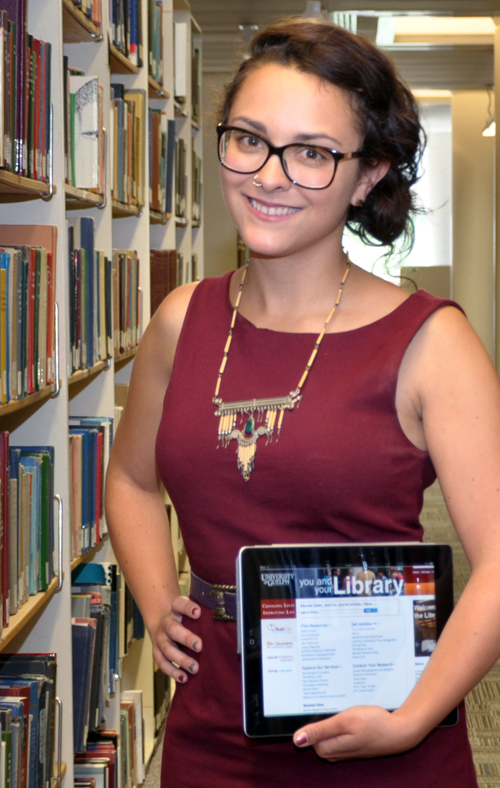At Guelph presents this story as part of a series that highlights University of Guelph leadership in teaching excellence and the scholarship of learning.

Technology is changing the way students learn, and it’s Melanie Parlette-Stewart’s job to guide them through an ever-changing technological landscape.
As a blended learning librarian at U of G’s McLaughlin Library, she combines the skills of a traditional librarian, such as showing people how to use library resources, with integrating new technologies into teaching and learning. “It was a really unique position,” she says of her new job, which she started earlier this year. “I love working with students and I also love technology, so it seemed like a really exciting opportunity.”
She sees technology as complementing — not competing with — face-to-face interaction in the classroom. Students can use online learning resources to review in-class material if they need extra help or when they’re studying for exams. “It’s changing how we approach things and how we reach out to students,” says Parlette-Stewart. If the majority of students in a class are struggling with a particular concept, online learning tools can help faculty answer their questions more efficiently through online discussion boards instead of individual meetings.
The library’s online subject guides give students access to the best resources for a particular course or subject area. “They can find out how to find the different types of information they will need to complete their assignments,” she explains. The library also offers video tutorials designed to teach students how to use library resources more effectively. The tutorials are based on the types of questions students ask most often at the “Ask Us” desk near the library’s main entrance. The library has developed online modules on topics such as academic integrity and time management; other library-related tutorials are in the works.
Technology makes learning more accessible, says Parlette-Stewart, because it’s no longer restricted to a specific time, day and location. Students can learn anytime, anywhere and at their own pace using a format that works best for their learning style. Collaborative online tools, for example, allow students to work together virtually without having to meet. Students who are too shy to ask a question in class can tweet their professor instead of raising their hand.
Technology is constantly evolving, which can be intimidating for some, but Parlette-Stewart wants to help people embrace it, not fear it. “Technology and the Internet, they’re such a part of our everyday lives now that I think it’s becoming more seamless between what we do face-to-face and what we do online.” For those who aren’t comfortable with using new technology, the library still provides face-to-face services. Accessibility is also a priority for the library, which offers services for students with disabilities. The video tutorials, for example, are available as transcripts or with open captioning.
Helping people find information, whether it’s online or in a book, is a big part of a librarian’s job. “There’s so much information out there,” she says. “You need to be able to find the good stuff, and finding the good stuff isn’t always quick or easy. I think part of our role is to help people get the skills they need to figure out whether it’s good or not and know how to use that information.” Those skills extend beyond student life and into the workplace, she adds.
Before joining U of G, Parlette-Stewart was the engineering and information technology liaison at Conestoga College, where she worked mostly with diploma and applied degree students in engineering and architecture. She ensured the library’s resources in these fields, such as technical standards, were up to date and taught students how to use them.
She and her husband, Christian Stewart, a fourth-year landscape architecture student at U of G, were already living in Guelph when she applied for the position of blended learning librarian at U of G. “We actually moved to Guelph so that he could take that program, because it’s the only one in Canada.”
She was also drawn to the library’s organizational structure, which she describes as team-based. Having met some U of G library staff at conferences, she was impressed by their dedication and enthusiasm. “Their excitement for what they were doing, and their creativity and collaboration were really exciting to me,” she says. “It seemed like an environment that would be really positive.”
An avid reader since childhood, Parlette-Stewart did her undergrad at Trent University, where she worked as a student librarian assistant and volunteered with Trent Students for Literacy, a program that pairs university students with children who are struggling with reading. She did her master’s degree in library and information science at Dalhousie University, which is where she became interested in working as a librarian in an academic setting.